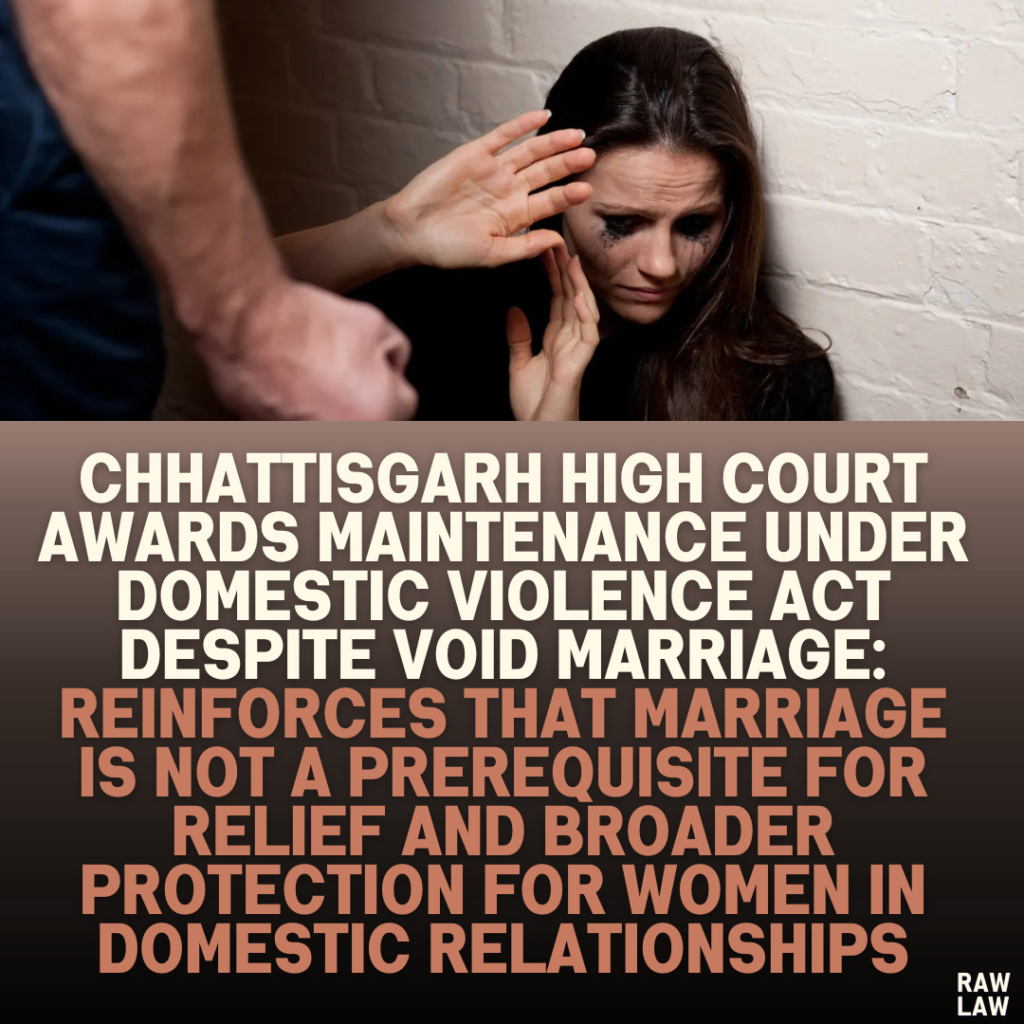Court’s Decision
The Chhattisgarh High Court overturned the judgments of the trial and appellate courts, which had previously dismissed the applicant’s claims. The High Court held that the applicant was a victim of domestic violence and was entitled to maintenance under the Domestic Violence Act, 2005, regardless of the validity of her marriage. The respondent was ordered to pay ₹3,500 per month as maintenance from the date of the judgment.
Facts
- Complaint Filed: The applicant filed an application under Sections 12, 18, 19, 20, and 22 of the Domestic Violence Act, 2005, alleging domestic violence. She claimed the respondent had married her by concealing his first marriage and then abandoned her after subjecting her to mental and physical abuse.
- Relief Sought: The applicant sought compensation of ₹5,00,000 and monthly maintenance of ₹25,000.
- Lower Courts’ Decision: Both the trial court and the appellate court dismissed the application, stating that the applicant failed to prove her domestic relationship with the respondent or the occurrence of domestic violence.
Issues
- Was the applicant entitled to maintenance under the Domestic Violence Act despite not proving a valid marriage?
- Did the lower courts err by dismissing the case for lack of documentary evidence supporting cohabitation?
Petitioner’s Arguments
- The applicant argued that the Domestic Violence Act does not mandate proof of a valid marriage to claim relief.
- She asserted that she lived with the respondent in a domestic relationship and had been subjected to domestic violence.
- The applicant emphasized that the Act’s purpose is to protect women from violence in domestic relationships, irrespective of their marital status.
Respondent’s Arguments
- The respondent claimed that the applicant failed to provide evidence of cohabitation, such as rent receipts or photographs.
- He argued that their alleged marriage had already been declared void by a competent court, negating her claim for relief under the Domestic Violence Act.
- The respondent denied subjecting the applicant to domestic violence.
Analysis of the Law
- Domestic Relationship:
- Section 2(f) of the Domestic Violence Act defines a “domestic relationship” as a relationship between two people who live or have lived together in a shared household, including relationships in the nature of marriage.
- The court held that a valid marriage is not a prerequisite for claiming relief under the Act.
- Relief for Aggrieved Persons:
- The court emphasized that the Act provides relief to women subjected to violence in domestic relationships, even if they are in a live-in relationship.
- Standard of Evidence:
- The proceedings under the Act are summary in nature and do not require stringent proof as in criminal trials. The evidence must establish the relationship and violence on the basis of probabilities.
Precedent Analysis
- The court referred to Lalita Toppo v. State of Jharkhand (2019), where the Supreme Court held that women in live-in relationships or estranged wives are entitled to protection and relief under the Domestic Violence Act.
- The court also cited Kunapareddy v. Swarna Kumari (2016), which clarified that proceedings under the Domestic Violence Act are civil in nature, with relief aimed at protecting the rights of women.
Court’s Reasoning
- Marriage Not Necessary:
- The court clarified that proving a valid marriage is not essential to claim relief under the Domestic Violence Act. The applicant only needed to establish a domestic relationship and evidence of violence.
- Adverse Inference Against Respondent:
- The respondent failed to rebut the applicant’s claims by providing his testimony or evidence. His failure to contest key allegations led to an adverse inference against him.
- Summary Nature of Proceedings:
- The court emphasized that the Domestic Violence Act does not require the procedural rigor of criminal trials. The applicant’s claims must be assessed based on probabilities and circumstances.
Conclusion
- The High Court held that the applicant successfully proved she was a victim of domestic violence.
- The court ordered the respondent to pay ₹3,500 per month as maintenance to the applicant.
- The trial and appellate courts’ judgments were set aside for failing to consider the broader objectives of the Domestic Violence Act.
Implications
- Broader Protection for Women:
- This judgment reinforces the Act’s purpose of safeguarding women in domestic relationships, even those outside the bounds of traditional marriage.
- Focus on Remedies Over Formalities:
- The court highlighted the remedial and protective nature of the Act, prioritizing the rights of women over procedural technicalities.
- Encouragement for Women to Seek Relief:
- The judgment may encourage more women in non-traditional relationships to seek protection and relief under the Domestic Violence Act without fear of procedural hurdles.




Pingback: Delhi High Court Rejects Plea Challenging Adverse APAR Grading of BSF Commandant: "Officers Must Set Examples of Discipline and Accountability in Paramilitary Forces" - Raw Law